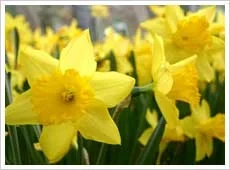Spring is just around the corner - good news for the flower industry, the season has been found to be the most popular season to buy flowers, either for the home or as a gift, although women are better at this than men. A survey commissioned by the International Flower Bulb Centre has found that 30% of UK adults are more likely to buy flowers during the spring time, far above any other season, including summer – when a comparatively small 17% buy flowers for the home. Only 12% buy flowers in winter but autumn fared the worst – only 2% regularly buy flowers in these colder months.

A host of golden daffodils
When given a selection of flowers to choose from as gifts for friends or family, 39% opted for daffodils as opposed to only five percent apiece for hyacinths and irises, and a tiny two percent choosing amaryllis. Daffodils retained their traditional springtime popularity and are the favourite among older respondents, with 46% of those over 55 choosing this option compared to 32% of 25 to 34 year olds. Tulips appear to be the youthful choice as only 14% of over 55s picked this compared to just over one in five (21%) of 25 to 34 year olds.
Perhaps unsurprisingly, the survey found that men are less likely to buy flowers regularly. Only 19% of UK males are buying bouquets at least once a month, as opposed to the 28% of women who do – nearly 10% more every month. 17% of men say they never buy flowers as presents compared to 12% of women.
Flowers as a gift?
When it comes to buying blooms, people are most likely to indulge others rather than themselves with a springtime gift - only 15% stated that they would never buy spring flowers for a gift. Nearly a quarter (24%), on the other hand, never buy flowers for the home, although again, men are worse culprits than women, with 30% stating that they never decorate their house with flowers as opposed to only 17% of women.
For full survey details and results, please click here







